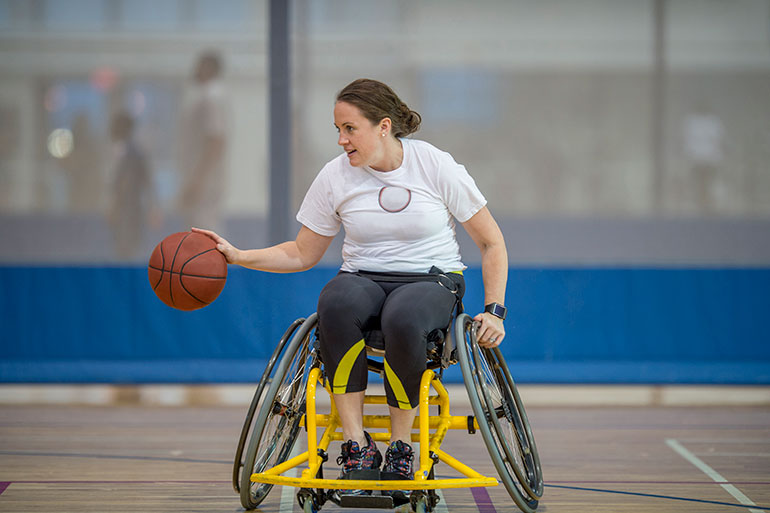
Conclusive evidence is supported by hundreds of studies, according to UBC researcher
What’s true for the general population is doubly true for those living with disabilities.
New research, led by UBC Okanagan Professor Kathleen Martin Ginis, has determined that exercise is essential for people living with disabilities—especially those with spinal cord injuries.
A professor with UBC Okanagan’s School of Health and Exercise Sciences, Martin Ginis is the founding director of SCI Action Canada, a national alliance of organizations and university-based researchers working to improve physical activity in people with spinal cord injury (SCI). As part of her work, her team completed a comprehensive study that concludes routine exercise improves the overall health and fitness in adults with spinal cord injury.
“Our research is a synthesis of every study published looking at the effect of exercise on fitness or cardio-metabolic health outcomes for people with spinal cord injury,” Martin Ginis explains. “There is now conclusive evidence that exercise leads to improvements in fitness for people with SCI and we have emerging evidence that exercise can also reduce cardiometabolic risk factors for people with SCI. Our review also identified the types and amounts of exercise that lead to these benefits.”
Martin Ginis describes cardiometabolic health as a cluster of risk factors connected to illnesses such as cardiovascular disease, diabetes and even obesity. Her team looked at more than 200 previously published studies; all of which examined the effects of exercise interventions (e.g., cardio, strength-training) on cardiorespiratory fitness, muscle strength, bone health, body composition and cardiovascular risk factors.
“This research is important because it provides an evidence base for developing exercise guidelines for adults with spinal cord injuries,” Martin Ginis says. “This is a significant step toward increasing exercise activity rates in a segment of the population that faces tremendous barriers to exercise participation.”
Martin Ginis’s latest research was recently published in Neurology and funded by the Rick Hansen Institute and the Social Sciences and Humanities Research Council of Canada.

UBC Professor Kathleen Martin Ginis.
About UBC's Okanagan campus
UBC’s Okanagan campus is an innovative hub for research and learning in the heart of British Columbia’s stunning Okanagan Valley. Ranked among the top 20 public universities in the world, UBC is home to bold thinking and discoveries that make a difference. Established in 2005, the Okanagan campus combines a globally recognized UBC education with a tight-knit and entrepreneurial community that welcomes students and faculty from around the world. For more visit ok.ubc.ca.
 Best surfers in Canada
Best surfers in Canada Guilty in fatal shooting
Guilty in fatal shooting ICBC warns teens for prom
ICBC warns teens for prom Little progress on emissions
Little progress on emissions Healing lodges underfunded
Healing lodges underfunded Liberals turn to influencers
Liberals turn to influencers Dies after self-immolation
Dies after self-immolation Israeli strike played down
Israeli strike played down Full Trump jury seated
Full Trump jury seated Lululemon cuts 100 jobs
Lululemon cuts 100 jobs Bitcoin's 'halving' arrives
Bitcoin's 'halving' arrives Lawsuit over missing nuts
Lawsuit over missing nuts Rockets season ends in PG
Rockets season ends in PG Warriors bounced in opener
Warriors bounced in opener Warriors ready for Round 2
Warriors ready for Round 2 Pulp Fiction turns 30
Pulp Fiction turns 30 Chris Pratt injured in movie
Chris Pratt injured in movie My name is not Elaine
My name is not Elaine




